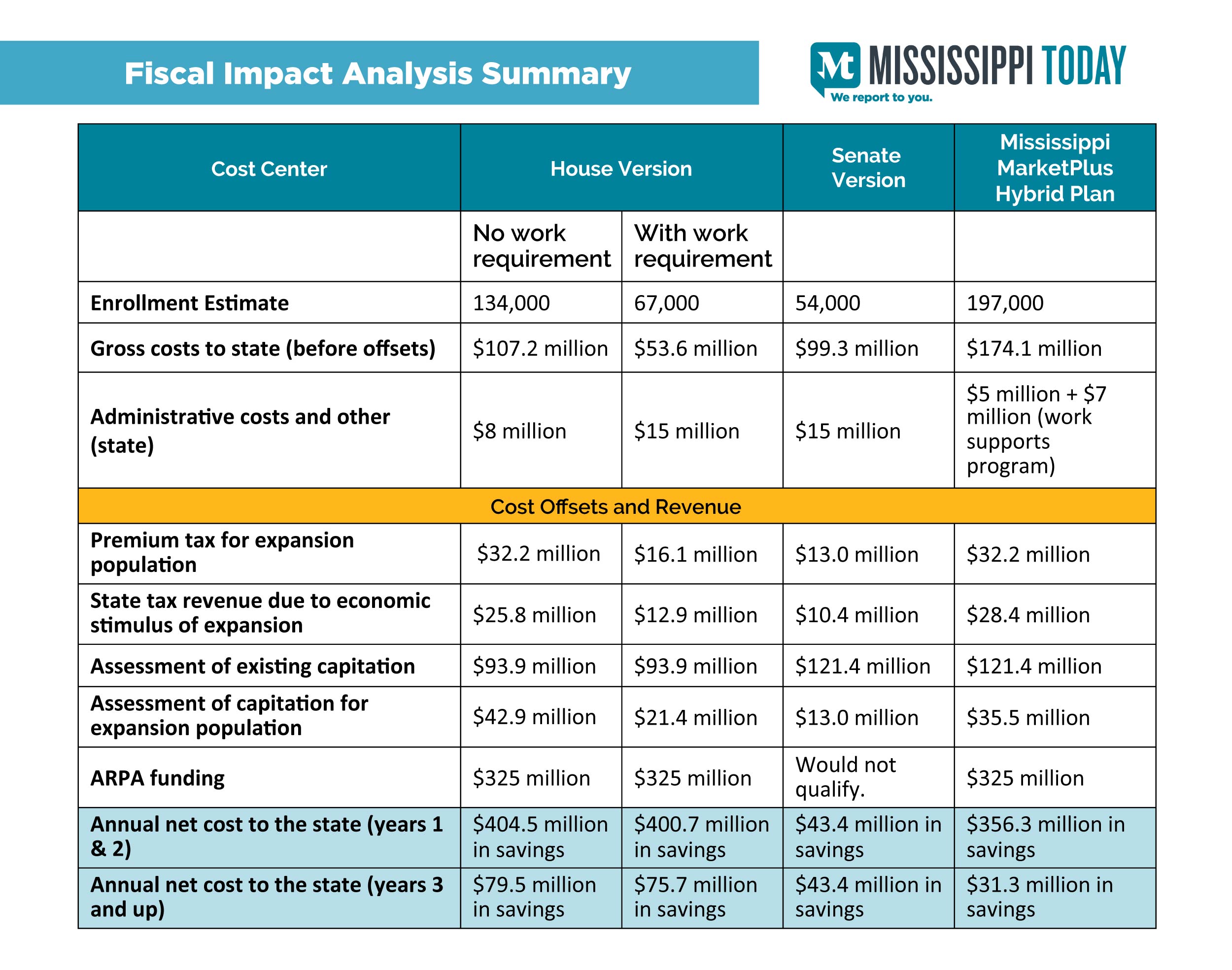Mississippi Today
Experts analyze House, Senate Medicaid expansion proposals, offer compromise plan

As Mississippi lawmakers look for compromise between widely differing House and Senate Mississippi Medicaid expansion plans, experts with a health research group have projected the costs, savings and efficacy of the plans and offered a third, potential compromise plan.
The analysis shows that under each plan, the state would see net annual savings – ranging from tens of millions to hundreds of millions of dollars – by expanding the state-federal Medicaid program to cover working, poor and uninsured Mississippians. The plans, the study says, also vary widely in how many Mississippians would be covered – from around 50,000 to nearly 200,000.
The study was commissioned by the Center for Mississippi Health Policy and conducted by the Hilltop Institute at the University of Maryland, Baltimore County. Hilltop has studied Medicaid expansion nationwide and recently testified before the Mississippi House Medicaid Committee.
“We wanted to get some updated numbers based on publicly available data,” said Morgan Henderson, director of analytics and research for Hilltop. “We really want to make sure folks having these discussions have data points they need.”
The study takes the House and Senate plans at face value, even though both contain elements not likely to be approved by the federal Centers for Medicare and Medicaid Services. The Senate plan, for instance, includes a stringent work requirement for coverage that, besides potentially costing millions in administrative fees, isn’t likely to be approved by CMS.
Both the House and Senate plans contain another potential poison pill that could prevent expansion from being implemented. They have 12-month moratoriums on people who qualify for the expanded Medicaid coverage from dropping private coverage and applying for Medicaid. CMS is highly unlikely to approve this, and such moratoriums would probably not meet constitutional muster in a court.
The options
Mississippi Senate plan
One striking difference between the Senate plan and the House and compromise plans is the Senate one would turn down about $1 billion a year in federal money to cover more expansion costs. It also would forego nearly $700 million over the first two years in enhanced federal funding that some refer to as a “signing bonus” for states that fully expand Medicaid per the federal Affordable Care Act.
The Senate plan would provide coverage to people making up to 100% of the federal poverty level – about $15,000 a year for an individual. Hilltop estimates this plan would cover about 54,000 people, although Senate leaders said they estimate about 40,000 people would sign up.
The Senate plan would require participants to work 120 hours a month or be enrolled as a full-time student or in a workforce training program. It would exempt some from this requirement, including parents of children under 6, people mentally or physically unable to work or those who are caregivers to disabled family members.
Cost
The state’s upfront cost of the Senate plan would be paid by a 3% tax on Medicaid managed care providers.
Hilltop estimates the Senate plan would cost the state a little over $114 million per year, including $15 million in administrative costs. But when these costs are offset by the tax on providers, the economic stimulus of expansion and other offsets or revenue, Hilltop estimates a net savings to the state of $43.4 million a year.
Mississippi House plan
The House plan would provide Medicaid coverage for people making up to 138% of federal poverty level, a little more than $20,00 a year for an individual. Hilltop estimates this would cover about 134,000 Mississippians (again, factoring in the “moratorium” on leaving private coverage).
The House plan calls for work requirements – 20 hours a week or enrollment as a student or in workforce development – but would still go into effect without the requirements if CMS fails to approve them.
Under this plan, Mississippi would draw down about $1 billion a year in increased federal Medicaid payments, and over the first two years, another nearly $700 million in enhanced federal payments.
Cost
The state share of upfront costs for the House plan would be covered by a 4% tax on Medicaid managed care providers.
Hilltop estimates the House plan, with no work requirement approved, would cost a little over $115 million, including $8 million in administrative costs. But when these are offset by the tax on providers, economic stimulus and other offsets or revenue, Hilltop estimates an annual savings for the state of more than $404 million a year for the first two years, then $79.5 million a year for the third year and beyond.
House Speaker Jason White and others have noted that the enhanced federal payments to the state totaling nearly $700 million over the first two years would cover all state costs for the first four years of the House expansion plan. White also noted that the House plan, even if a work requirement is not approved, would require the managed care organizations to track employment and other data from those covered.
Compromise ‘hybrid plan‘
Hilltop’s “Mississippi MarketPlus Hybrid Plan” would offer expanded Medicaid coverage through the state’s managed care program for those making under 100% of the federal poverty level. For those making 100% to 138% (up to $20,000 for an individual) of poverty level, the plan would use federal money to provide assistance for them to buy private insurance plans through Mississippi’s marketplace exchange.
Hilltop estimates this plan would provide coverage for 197,000 Mississippians.
The plan would require managed care companies to provide employment support and require mandatory referral to workforce training. It would also require those covered to pay marketplace insurance co-pays, but would not include a work requirement or moratorium on people leaving private insurance.
Like the House plan, this plan is expected to qualify the state for enhanced federal Medicaid payments and the two-year “signing bonus” of nearly $700 million.
Cost
The plan, like the Senate’s, includes a 3% tax on Medicaid managed care providers to help cover state costs.
Hilltop estimates the upfront cost to the state for this plan would be a little more than $186 million, including $12 million in administrative costs (including work support). But these would be offset by the tax on providers, economic stimulus from expansion and other offsets or revenue. Hilltop estimates a net savings to the state for this plan of more than $356 million a year for the first two years, then $31.3 million a year in savings for years three and up.
The Hilltop study also noted this plan would allow the state to receive a 90% federal match for services currently funded only with state dollars, including hospital services for incarcerated people and some behavioral health services.

Other findings
Hilltop’s report says that Medicaid work requirements – when they were previously allowed by the feds – have not shown to increase workforce participation. It said, “Moreover, the Arkansas experience demonstrates that the administrative burden in reporting work status can lead to Medicaid coverage loss for the working poor – thus hurting the exact individuals designed to be covered under work requirements.”
A Georgia program similar to the Mississippi Senate’s plan in several regards, has shown that stringent work requirements result in low enrollment and high administrative costs, the Hilltop study notes. As of recently, the Georgia program had enrolled only a few thousand people and over 90% of its costs to-date have been administrative costs and consulting fees. Georgia is still battling the federal government in court over its work requirements.
The Hilltop study found the Senate’s plan “contains high budget risk” to the state. Since the plan eschews extra federal funding available for expansion, “if enrollment exceeds estimates, there would be proportionally greater budget overruns in the Senate version than the alternative plans.” It noted that to protect state coffers, language could be inserted to the House or hybrid plan that rescinds the expansion should the enhanced federal match drop.
This article first appeared on Mississippi Today and is republished here under a Creative Commons license.![]()
Did you miss our previous article…
https://www.biloxinewsevents.com/?p=349711
Mississippi Today
Government secrecy tends to bite Mississippi in the butt. It’s happened again
The state Senate Republican leadership didn’t plan to fail on a Mississippi tax overhaul. It failed to plan.
And when pressed late in the 2025 legislative session to come up with a proposal to counter the House Republican leadership’s sweeping bill, Senate leaders did so behind closed doors and hurriedly.
The result: a majority of legislators passing a tax overhaul bill full of math errors that accidentally did what Senate leaders didn’t want. And it stripped out safeguards for taxpayers that both the House and Senate leadership said were prudent.
No matter how much Gov. Tate Reeves praises House Bill 1 as “one big, beautiful bill,” borrowing a phrase from President Trump as he signed it into law, it was passed through secrecy, subterfuge and error, not representative democracy.
Had the Senate perhaps taken a little more time, allowed more input from and access to its strategizing from rank-and-file lawmakers, and who knows, maybe even a little crowd-sourcing allowing the public to scrutinize the bill before passing it, maybe the blunder could have been prevented.
READ MORE: OOPS! Senate sent House an income tax bill with typos. House ran with it. What’s next?
And while House leaders should receive praise for coming up with an initial public-facing tax overhaul plan through months of public hearings and forums, that’s not what was passed into law. House leaders played a game of secret squirrel to pass the Senate’s mistakes into law. Then instead of negotiating in good faith to fix the problems, House leaders tried to shanghai the Senate in backroom negotiations to pass a few plums they wanted, such as legalized online sports betting and a sales tax increase.
The end result: Historically bitter infighting among state GOP leaders to the point they couldn’t even pass a state budget, their main job. And we have communications between Mississippi’s top legislative leaders and governor, all Republicans, that these days are often reduced to mean tweets or Facebook posts about each other, not earnest negotiations.
READ MORE: The Typo Tax Swap Act of 2025 may be the most Mississippi thing ever
Mississippi government’s default setting is secrecy, from public records and meetings to access to elected officials, and it has never served our citizens well. From a black-ops agency that spied on its citizens for nearly two decades to festering, generational government corruption that has cost taxpayers hundreds of millions of dollars, secrecy is neither good politics nor good policy.
Major, sweeping state policy should be conducted in the open and with public input. But as the national and world economies plunge into turmoil that is sure to impact Mississippi, our new tax code lacks safeguards that both House and Senate leaders said were needed — all because of secrecy and lack of planning and communication.
This article first appeared on Mississippi Today and is republished here under a Creative Commons Attribution-NoDerivatives 4.0 International License.
Mississippi Today
Ward 6 council candidates face the image of south Jackson versus the reality
Driving down roads in south Jackson in recent weeks, residents were inundated with placards of smiling faces and names in bright, bold fonts of people hoping to be the next Ward 6 councilman.
In some neighborhoods, the streets were as littered with campaign signs as they are overgrown lots and abandoned properties in between neatly kept homes.
“The homes in the surrounding area and businesses in Ward 6 have been decimated. It looks like a bomb went off,” said Sylvia Walker, Ward 6 board member for the Jackson Association of Neighborhoods. “We’ve seen the businesses hollow out and nothing come back in. It’s disheartening. It’s sad.”
Walker said the image of south Jackson must be interrogated. Not enough people are talking about the good happening in Ward 6, she said.
“South Jackson is very diverse and not just one specific area,” said Walker. “I think the biggest misconception is that south Jackson is just full of dilapidated homes, and the people are poverty-stricken and destitute, and that’s not true.”
Ward 6 has the largest population of Jacksonians, with just over 23,000 people. It also has the highest number of Black residents, according to data from the City of Jackson’s website.
Jackson also has a high number of abandoned properties owned by the state. According to data from the Secretary of State’s office, there are about 1,900 tax-forfeited properties in the City of Jackson.
There will be a Democratic runoff on April 22 between two candidates for the Ward 6 city council seat. Emon Thompson Sr. garnered 714 votes and Lashia Brown-Thomas came in second with 652 votes. Voter turnout was low, with less than 3,200 votes cast in a ward with a voting age population of more than 16,000. There were nine contenders for the coveted council seat, more than any other council race.
Candidates for the coveted Ward 6 seat envision a more beautiful, thriving south Jackson. After a stacked primary, two candidates have made it to the runoff to replace Aaron Banks, former council person who faces criminal charges for allegedly accepting cash bribes in exchange for his vote on a development project. He pleaded not guilty.
Banks is familiar with the image problem in south Jackson. He said he’s made progress with more demolitions and landscaping work done than others in the past. This includes the demolition of Casa Grande Apartments and Appleridge Shopping Center.
“I’ve always said that I would serve two terms, and we got a lot of work done,” Banks said in a recent interview with Mississippi Today.
Brown-Thomas said that crime and blight are the biggest issues affecting Ward 6. The law enforcement officer wants to hold people accountable for their part in the perceived image of a decaying south Jackson.
“The city has codes, and if these people are not holding up to the codes, they need whatever punishment there is,” Brown-Thomas said. “If they aren’t holding the property up, then they should not have the property.”
She said that if she’s elected, she’ll work to get police officers higher wages, and will remain transparent and available to constituents.
“It’s not going to happen overnight, but it will take some time,” Brown-Thomas said. “I’m not saying it’s going to come in a year, not even two years, but we have to address the issues first, then everything else will fall in line.”

Thompson Sr., a business owner and retired veteran, said that a lot of the issues with blight comes down to enforcement.
“We need to, first of all, clean up our blighted properties by using the laws that we already have,” Thompson said. “The city already has ordinances with enough teeth to deal with blight.”
South Jackson voters don’t turn out like they should, he said, which can lead to a distrust in the system. He hopes, if elected, to be able to reach constituents where they are and keep them a part of the process in restoring their communities, like water improvement or curbing crime.
“Out of the 40 something thousand people that’s in south Jackson, maybe 3,900 people vote in the municipal elections,” he said. “They don’t have faith in the government anymore.”
“…If there’s a reason why we’re not getting any services out here, then I want to make sure I communicate that with a constituent so they can continue to have hope,” he said.
Representative Ronnie Crudup, Jr., D-Jackson, said that residents’ migration out of Jackson creates bigger issues for communities.
“To me, blight is just a symptom of a larger problem. The people are leaving the city of Jackson, and the population is decreasing,” Crudup said. “When people leave the properties, you end up with squatters and vagrants who move into these properties and tear them up.”
Crudup has been renovating and demolishing blighted properties in south and west Jackson for nearly eight years. So far, he said he’s renovated about 35 homes.
“Even though we are demoing and tearing down one or two properties, when people leave, that leaves other ones there,” he said. “You got all these blighted properties all around south and west Jackson, and some even in parts of north Jackson now, because people are leaving.”
He said the one thing that’s needed most: more funding from all levels of government for blight mitigation work.
“There needs to be more money from the legislature, but there needs to be more money allocated from the city council too,” Crudup said. “I think the city is going to have to take clean up efforts to a higher circumstance, and let the legislature see that they’re serious about this, and also get the county involved and let them know ‘Hey, we need all the help we can get.’”
And, the perception that city leaders have abandoned south Jackson is not necessarily right. Former Jackson Mayor Harvey Johnson said that blight is an issue that affects not only south Jackson but all parts of the city. Mitigating blight is going to take an intergovernmental approach, he said.
“I know that in some cases, some people feel they’ve been sort of abandoned, but I don’t think that’s the case,” Johnson said. “It may be a lack of resources to attack the problem and it’s going to require all governments to work together.”
Walker said she remembers when the city’s southern boundary changed and her neighborhood, which had been part of Byram, came inside Jackson city limits. A small portion of her ward was annexed by the city of Jackson in 2006 as part of Byram’s reincorporation. In the last couple of decades, she said she’s seen people be forced out of their homes due to the recession. Others simply chose to leave.
“We’ve had a turnover, but the neighborhood is still relatively stable,” Walker said. “When we moved in, a lot of people moved out.”
Walker said that while her neighborhood isn’t struck by blight, she sees abandoned properties while making her way through the community and near her church.
When thinking of a candidate that she would want to vote for, Walker said she’s looking for a good communicator who can be an advocate for the ward.
“We need someone that’s forward thinking. Someone that has the best interests of the residents of south Jackson and an understanding of the vast diversity of the ward,” she said. “Someone that’s able to work with other members of the City Council. Someone able to work with our board of supervisors and state legislators to find solutions to some of these issues.”
Banks said that his greatest achievement as city councilman was hosting quarterly town hall meetings to inform his constituents on the importance of ordinances and legislation created to better their lives.
“There’s one piece of legislation that deals with overhanging tree limbs and limbs. That idea came from a constituent,” he said. “When you see constituents being able to give informed ideas on legislation, which is the job of a council member, I think that’s an achievement because then what that says is there’s involvement in the process.”
“I hope the next person will understand that communicating with the people is key, and that the people of Ward 6 are resilient,” Banks said. “As long as they continue to communicate and stay in the scope of their job and work with the administration, there’s a lot that can be done.”
This article first appeared on Mississippi Today and is republished here under a Creative Commons Attribution-NoDerivatives 4.0 International License.![]()
Mississippi Today
On this day in 1962, white cop killed Cpl. Roman Ducksworth
April 9, 1962

Cpl. Roman Ducksworth Jr., a 27-year-old Black military police officer stationed at Fort Ritchie, Maryland, was traveling home by bus to Mississippi. His wife, Melva, was expecting their sixth child and was now in the hospital because of complications.
By the time he arrived home in Taylorsville, Mississippi, he had fallen asleep. The driver called William Kelly, a white police officer onto the bus to wake him. Kelly instead arrested the serviceman, claiming he was drunk.
Off the bus, the two struggled, and the officer shot twice, striking Ducksworth in the chest. He died without knowing his wife had just given birth to a healthy baby girl. Kelly claimed he shot Ducksworth in self-defense, and he was never prosecuted.
Later he sent a message to Ducksworth’s father: “If I’d known it was your son I wouldn’t have shot him.” The father replied, “I don’t care whose son it was, you had no business shooting him.”
More than 2,000 attended the funeral for Ducksworth, who was buried with full military honors, including a 16-gun salute by an integrated honor guard. He is among 40 martyrs listed on the Civil Rights Memorial in Montgomery, Alabama.
This article first appeared on Mississippi Today and is republished here under a Creative Commons Attribution-NoDerivatives 4.0 International License.![]()
-

 News from the South - South Carolina News Feed7 days ago
News from the South - South Carolina News Feed7 days agoSouth Carolina clinic loses funding due to federal changes to DEI mandates
-

 The Center Square6 days ago
The Center Square6 days agoCA fails audit of federal programs, 66% of COVID unemployment benefits in question | California
-

 News from the South - Arkansas News Feed6 days ago
News from the South - Arkansas News Feed6 days agoArkansas prison board approves contractor search for Franklin County prison
-

 News from the South - Alabama News Feed6 days ago
News from the South - Alabama News Feed6 days agoAlabama House passes public school cell phone ban
-

 News from the South - Georgia News Feed7 days ago
News from the South - Georgia News Feed7 days agoBond hearing for man accused of murdering pregnant ex | FOX 5 News
-

 News from the South - Alabama News Feed5 days ago
News from the South - Alabama News Feed5 days ago‘Hands Off!’ Protest Held in Huntsville Saturday | April 5, 2025 | News 19 @ 9 P.M.
-

 News from the South - Oklahoma News Feed6 days ago
News from the South - Oklahoma News Feed6 days agoRetired Cops Sound Alarm on Pension Board Shift
-

 News from the South - North Carolina News Feed6 days ago
News from the South - North Carolina News Feed6 days agoState appeals court finds merit in protests of nation’s last unsettled election | North Carolina











































